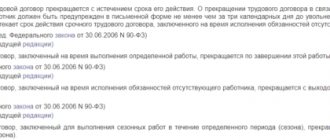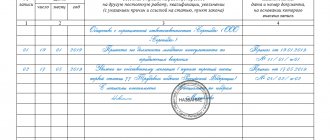What does the article talk about? 59 of the Labor Code of the Russian Federation with comments 2015–2016?
An employment contract (EA) for a specific period can only be concluded in cases where an open-ended agreement is not possible due to the nature of the work proposed or the circumstances in which it will be performed. If there are no grounds for limiting the contract to a time frame, it is recognized as concluded for an indefinite period. The employer’s evasion from concluding a permanent contract in this case may entail liability under Art. 5.27 Code of Administrative Offenses of the Russian Federation.
Art. 59 of the Labor Code of the Russian Federation with commentaries clearly defines the categories of persons and cases when the conclusion of an urgent TD is mandatory, and when it is allowed by agreement of the parties. We'll talk about them further.
Commentary on Article 59 of the Labor Code of the Russian Federation
As mentioned above, the employment contract must also indicate the circumstances (reasons) that served as the basis for its conclusion. In this regard, we note again that the current version of Article 59 of the Labor Code of the Russian Federation contains a list of situations in accordance with which a fixed-term employment contract should or can be concluded.
We emphasize that an employment contract concluded for a specific period in the absence of sufficient grounds established by the court is considered concluded for an indefinite period.
Concluding fixed-term employment contracts in order to evade the provision of rights and guarantees provided for employees with whom an employment contract is concluded for an indefinite period is prohibited. The circumstances under which a fixed-term employment contract can now be concluded by agreement of its parties are set out in part two of Article 59 of the Labor Code of the Russian Federation. Upon expiration, a fixed-term employment contract can be:
terminated in the manner and on the grounds provided for by law, including early (both at the initiative of the employee and at the initiative of the employer);
by agreement of the parties, extended for a new term (as a fixed-term contract).
However, if, after the expiration of the fixed-term employment contract, none of the parties demanded its termination and the employee continues to perform the assigned work, then the condition on the fixed-term nature of this employment contract loses force and the latter is subsequently considered to be concluded for an indefinite period.
In what cases, according to Article 59 of the Labor Code of the Russian Federation, is a fixed-term employment contract required (Part 1 of Article 59 of the Labor Code of the Russian Federation)?
To conclude a TD limited by a time frame, Article 59 of the Labor Code of the Russian Federation requires with a candidate being employed:
- in the place of a temporarily replaced employee, whose place must be retained in his absence (a fairly common case is registration of an urgent TD in place of a maternity leave);
- to perform temporary work for a period of no more than 2 months;
- for seasonal work (for example, in agriculture);
- for work abroad;
- for work that is not typical of the candidate’s normal activities (they can be called one-time - reconstruction, installation, commissioning, etc.), as well as for a deliberately temporary (up to a year) expansion of the business;
- to an organization that was created for a clearly defined period or to perform a clearly defined job;
- to perform any work in cases where its completion cannot be determined by a specific date (for example, office renovation, if the completion date is initially unknown);
- for the duration of practice, vocational training, internship;
- for work in elected bodies;
- in the direction of the employment service for temporary and public work;
- for alternative civil service;
- in some other cases in accordance with the Labor Code of the Russian Federation or other federal laws.
Article 59. Fixed-term employment contract
Article 59. Fixed-term employment contract
[Labor Code] [Part Three] [Section III] [Chapter 10]
A fixed-term employment contract is concluded:
for the duration of the performance of the duties of an absent employee, whose place of work is retained in accordance with labor legislation and other regulatory legal acts containing labor law norms, a collective agreement, agreements, local regulations, and an employment contract;
for the duration of temporary (up to two months) work;
to perform seasonal work, when, due to natural conditions, work can only be carried out during a certain period (season);
with persons sent to work abroad;
for carrying out work that goes beyond the normal activities of the employer (reconstruction, installation, commissioning and other work), as well as work related to a deliberately temporary (up to one year) expansion of production or the volume of services provided;
with persons entering work in organizations created for a predetermined period or to perform a predetermined job;
with persons hired to perform predetermined work in cases where its completion cannot be determined by a specific date;
to perform work directly related to practice, vocational training or additional professional education in the form of an internship;
in cases of election for a certain period to an elected body or to an elective position for paid work, as well as employment related to the direct support of the activities of members of elected bodies or officials in state authorities and local self-government bodies, in political parties and other public associations;
with persons sent by employment services to temporary work and public works;
with citizens sent to perform alternative civil service;
in other cases provided for by this Code or other federal laws.
By agreement of the parties, a fixed-term employment contract may be concluded:
with persons entering work for employers - small businesses (including individual entrepreneurs), the number of employees of which does not exceed 35 people (in the field of retail trade and consumer services - 20 people);
with age pensioners entering work, as well as with persons who, for health reasons, in accordance with a medical certificate issued in the manner established by federal laws and other regulatory legal acts of the Russian Federation, are allowed to work exclusively of a temporary nature;
with persons entering work in organizations located in the Far North and equivalent areas, if this is related to moving to the place of work;
to carry out urgent work to prevent disasters, accidents, accidents, epidemics, epizootics, as well as to eliminate the consequences of these and other emergency circumstances;
with persons elected through a competition to fill the relevant position, conducted in the manner established by labor legislation and other regulatory legal acts containing labor law norms;
with creative workers of the media, cinematography organizations, theaters, theatrical and concert organizations, circuses and other persons involved in the creation and (or) performance (exhibition) of works, in accordance with the lists of works, professions, positions of these workers, approved by the Government of the Russian Federation Federation, taking into account the opinion of the Russian Tripartite Commission for the Regulation of Social and Labor Relations;
with managers, deputy managers and chief accountants of organizations, regardless of their legal forms and forms of ownership;
with persons receiving full-time education;
with crew members of sea vessels, inland navigation vessels and mixed (river-sea) navigation vessels registered in the Russian International Register of Vessels;
with persons applying for part-time work;
in other cases provided for by this Code or other federal laws.
When is it allowed to conclude an agreement with an employee for a limited period (Part 2 of Article 59 of the Labor Code of the Russian Federation)?
According to Art. 59 of the Labor Code of the Russian Federation, a fixed-term employment contract, by agreement with the employee, can be concluded:
- employers (firms and individual entrepreneurs) – small businesses employing less than 35 people (less than 20 people in retail and consumer services);
- with old-age pensioners, as well as with persons who, for medical reasons, can only work in temporary jobs;
- “northern” companies if employment requires moving to the place of work;
- to carry out urgent work during various emergencies, both to prevent them and to eliminate the consequences;
- with persons elected to positions through competition;
- with creative workers of the media, cinema, theaters, circuses, etc. - according to the list from the Decree of the Government of the Russian Federation dated April 28, 2007 No. 252;
- with managers, their deputies, chief accountants, regardless of the legal form and form of ownership of the company;
- with full-time students;
- with crew members of sea vessels, inland navigation vessels and mixed (river-sea) navigation vessels registered in the Russian Maritime Register of Shipping;
- for part-time work;
See also “How to properly register part-time work according to the Labor Code of the Russian Federation?”
- in other cases, in accordance with the Labor Code of the Russian Federation or other federal laws.
In these cases (Part 2 of Article 59 of the Labor Code ), the nature of the work and the conditions for its performance do not play a role. The parties agree to temporary employment, which means the TD can be urgent.
Commentary to Art. 59 Labor Code of the Russian Federation
Comments on articles of the Labor Code will help you understand the nuances of labor law.
§ 1. The commented article in the new edition consists of two parts.
It is necessary to be guided by the fact that the legislator, in the light of the Federal Law of June 30, 2006, provides for the conclusion of a fixed-term employment contract in cases where the employment relationship cannot be established for an indefinite period, taking into account the nature of the work to be performed or the conditions for its implementation. These cases are indicated in Part 1 of Art. 59. This list is open.
In Part 2 of Art. 59 lists cases of concluding a fixed-term employment contract by agreement of the parties.
This article states that such an agreement is concluded to replace a temporarily absent employee, who, in accordance with the law, retains his place of work.
The legislator lists cases in which an employee who is absent from work retains his place of work (position). So, for example, an employee retains his place of work if he is granted leave to care for a child until he reaches the age of three (see Article 256 of the Labor Code and the commentary thereto) or for the period of workers’ participation in a strike (see Article 414 of the Code and a commentary thereto).
§ 2. A fixed-term employment contract is concluded not with all employees of organizations located in the Far North, but only with those who have moved to their place of work from other regions of Russia.
§ 3. A fixed-term employment contract can be concluded with seasonal workers. Seasonal work is considered to be work that is performed during a certain period (season), but not more than six months due to natural and climatic conditions.
§ 4. An employment contract can be concluded for a certain period (up to two months). Persons who have entered into such an agreement are recognized as temporary workers.
§ 5. A fixed-term employment contract is concluded with persons entering small business organizations with up to 35 employees (in retail trade and consumer services organizations - up to 20 employees). In this case, it should be borne in mind that small businesses are understood as commercial organizations, as well as individuals engaged in entrepreneurial activities without forming a legal entity (see Federal Law of June 14, 1995 “On State Support of Small Business in the Russian Federation” (SZ RF. 1995 N 25. Art. 2343), as amended by the Federal Law of February 2, 2006).
§ 6. In accordance with Part 2 of this article, fixed-term employment contracts can be concluded with students, graduate students studying full-time.
§ 7. According to the current labor legislation, fixed-term employment contracts can be concluded with scientific, pedagogical and other categories of workers based on the results of a competition (see Article 332 of the Labor Code and the commentary thereto).
§ 8. A fixed-term employment contract takes place when hiring, for example, persons to perform obviously defined work in cases where its implementation (completion) cannot be determined by a specific date; persons sent for temporary work by employment services, including public works.
§ 9. A fixed-term employment contract may be concluded when an employee is elected for a certain period of time to an elected body or to an elective position for paid work.
§ 10. Fixed-term employment contracts are also concluded with persons sent to work abroad, part-time. Given in parts 1 and 2 of Art. 59 of the Labor Code, the list of cases of concluding fixed-term employment contracts is open, since it also talks about other cases provided for by federal laws. For example, heads of consumer cooperation organizations created by consumer societies or unions are appointed to positions for a period of up to five years (see Law of the Russian Federation of June 19, 1992 “On Consumer Cooperation (Consumer Societies, Their Unions) in the Russian Federation” (as amended by March 21, 2002) // Gazette of the Armed Forces of the Russian Federation. 1992. N 30. Art. 1788).
§ 11. When concluding a fixed-term employment contract with persons entering work in organizations created for a predetermined period of time or to perform a predetermined job (paragraph 9 of Article 59 of the Labor Code), the term of the employment contract is determined by the period for which such an organization was created . Therefore, termination of an employment contract with these employees on the basis of expiration of the employment contract can be carried out if the organization actually ceases its activities due to the expiration of the period for which it was created, or the achievement of the purpose for which it was created, without transfer of rights and obligations in the order of succession to other persons (Article 61 of the Civil Code of the Russian Federation).
If a fixed-term employment contract was concluded to perform a specific job in cases where its implementation (completion) cannot be determined by a specific date (paragraph 10 of Article 59 of the Labor Code), such an agreement, by virtue of Part 2 of Art. 79 of the Code is terminated upon completion of this work.
If it is established during the trial that there have been multiple conclusions of fixed-term employment contracts for a short period of time to perform the same labor function, the court has the right, taking into account the circumstances of each case, to recognize the employment contract as concluded for an indefinite period.
For how long is temporary employment possible?
The issue of the duration of temporary TD is regulated by Art. 58, not Art. 59 Labor Code . However, only a maximum of 5 years has been established. The minimum terms are not specified anywhere. Which means they can be anything. It all depends on the job for which a new, albeit temporary, member of the workforce is hired.
This period must be specified in the contract. Moreover, as follows from the rules of Article 59 of the Labor Code of the Russian Federation , it can be determined not only by a calendar date, but also by some event. For example, the departure of the replaced employee, the end of work or the season, etc.
If the term is not specified, the TD will be considered unlimited. Most likely, in the event of a dispute, the court will consider as such an agreement concluded for a period exceeding 5 years.
Is it possible to extend the temporary contract? For how long?
The law allows for the possibility of extending a temporary contract for certain categories of workers. This is due to the occurrence of certain life situations. Categories of workers for whom a temporary employment contract can be extended include pregnant women, athletes and university employees. The term of the contract with a pregnant woman is extended until the end of the pregnancy. To do this, the employee must provide a certificate and write an application. An employer can fire an employee on the day the maternity leave ends. For athletes, there is the possibility of a temporary transfer to another employer with the conclusion of an agreement for a period of no more than a year. This agreement can be extended for an indefinite period or a period determined by the parties if:
- the athlete continues to work in a new place after the end of the temporary period;
- neither the first nor the second employer requires termination of the temporary contract.
A university employee initially working under a fixed-term contract can count on its extension for a period of no more than 5 years or for an indefinite period. To do this, he must be elected through a competition to a previously held position or to a new position. The term of the contract is changed by agreement of the parties. There is also the possibility that it will be necessary to continue performing certain work after the end of the fixed-term contract. In this case, the employer will not have a conditional need to transfer the employee to a permanent basis. Is it possible in this case to extend the temporary contract without transforming it into an indefinite one? Legislation is interpreted differently, and at the moment there is no consensus on this matter. If we proceed from a literal interpretation, then the term of an employment contract can be extended only in cases specified by law. We have already listed them. However, judicial practice shows that there is a possibility of extending the term of a temporary contract in cases not provided for by law. For example, if, in fact, at the time of termination of a fixed-term contract, which was concluded for the purpose of replacing the main employee, the main employee never returned to work. Even if the court recognizes the extension of the employment contract as lawful, its total term, taking into account this extension, should not exceed 5 years. This is the maximum duration of a fixed-term contract, according to Article 59 of the Labor Code of the Russian Federation. Sometimes it is more expedient for an employer to wait until the termination of a fixed-term contract in order to conclude a new temporary employment contract with the same employee, provided that the grounds for concluding such a contract are preserved. Otherwise, the employer always remains at risk of recognizing the extended contract as indefinite. If the procedure for extending a temporary contract is nevertheless used, it is formalized in an additional agreement. The additional agreement must be drawn up before the temporary contract expires, otherwise it will again be considered indefinite.
Is a record of work under a fixed-term contract entered into the work book?
Of course they do. Work books of conscripts are filled out according to general rules.
Read more about these rules in the article “Procedure for filling out a work book - sample 2015-2016”.
However, an indication that the contract is urgent is not made in the admission record, since this is not provided for by the regulations governing the maintenance and execution of books.
Moreover, the reflection of this information may be regarded as a violation of labor legislation and entail liability under Art. 5.27 Code of Administrative Offenses of the Russian Federation.
The fact that an employee worked under a contract limited in time can only be found out if he is dismissed due to the expiration of the TD - when, in order to justify the dismissal, the employer refers to clause 2, part 1, art. 77 Labor Code of the Russian Federation.
What is the procedure for terminating a temporary employment contract?
The rules for terminating urgent TD are specified in Art. 79 Labor Code of the Russian Federation. The moment of termination depends on how the term clause was formulated in the contract itself.
If an exact date is specified, the TD ends on its arrival.
A TD concluded for the duration of any work terminates when it is completed, a “seasonal” TD - with the end of the season.
The contract for replacing a temporarily absent employee will expire only upon his return to work.
See also: “Dismissal of a temporary worker - on what date?”
IMPORTANT! The employer must notify the employee in writing of the upcoming dismissal at least 3 days before termination of the contract. An exception is a TD concluded to replace a temporarily absent employee.
If the TD period has expired and neither party has taken any action to terminate the relationship and the employee continues to work, the working agreement automatically turns into an open-ended one.
How to properly register an employee hired to replace a temporarily absent one?
When hiring a person who will replace one of the employees during his absence, the Labor Code - Article 59 - prescribes the conclusion of an urgent TD. The reasons for the absence of a specialist may be different:
- maternity or any other leave;
- long-term disability;
- off-the-job training, etc.
The length of his absence is not important either. But here the requirement for a maximum 5-year term of TD should not be violated.
We have already indicated above that such an agreement is valid until the moment the person being replaced returns to duty. Of course, at the time of registration of the replacement, the date of its return may be unknown. In this regard, you should pay attention to the wording of the terms of the contract. It should be stated in it that the contract was concluded for the duration of the duties of X.H.H. (full name of the person being replaced) for the period, for example, maternity leave, until X.H.X returns to work .
An admission order is issued in a similar manner. So, in the column “Hire by” they indicate “before X.H.H. goes to work”, and in the line “Conditions of employment, nature of work” they write “for the duration of the duties of X.H.H., absent for the period of maternity leave.”
When the absent employee returns from vacation, a dismissal order is issued to the temporary employee under clause 2, part 1, art. 77 Labor Code of the Russian Federation.








